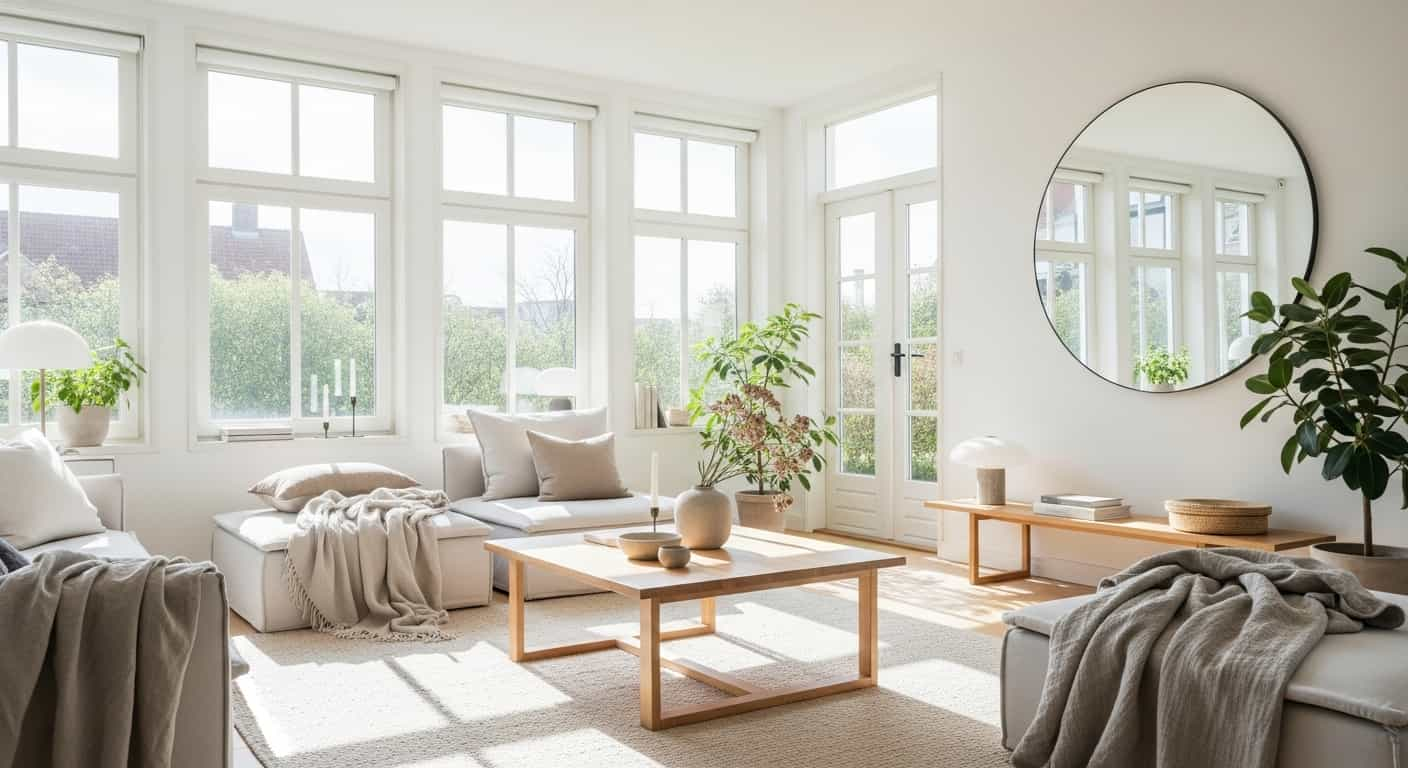At first glance, Japandi design and Feng Shui might seem like two separate concepts—one a modern interior design trend, the other an ancient Chinese philosophical system. However, when you look closer, you’ll find they share a profound connection. Both are rooted in the pursuit of simplicity, balance, and a deep respect for nature. Japandi, the beautiful fusion of Japanese minimalism and Scandinavian functionality, naturally aligns with the core principles of Feng Shui.
This synergy creates homes that are not only stylish but also deeply nourishing to the soul. By understanding how these two philosophies overlap, you can design a space that feels calm, intentional, and full of positive energy. This guide will explore the beautiful relationship between the Japandi style and Feng Shui and provide practical tips for using mirrors to enhance this harmonious blend.
The Shared Philosophy of Japandi and Feng Shui
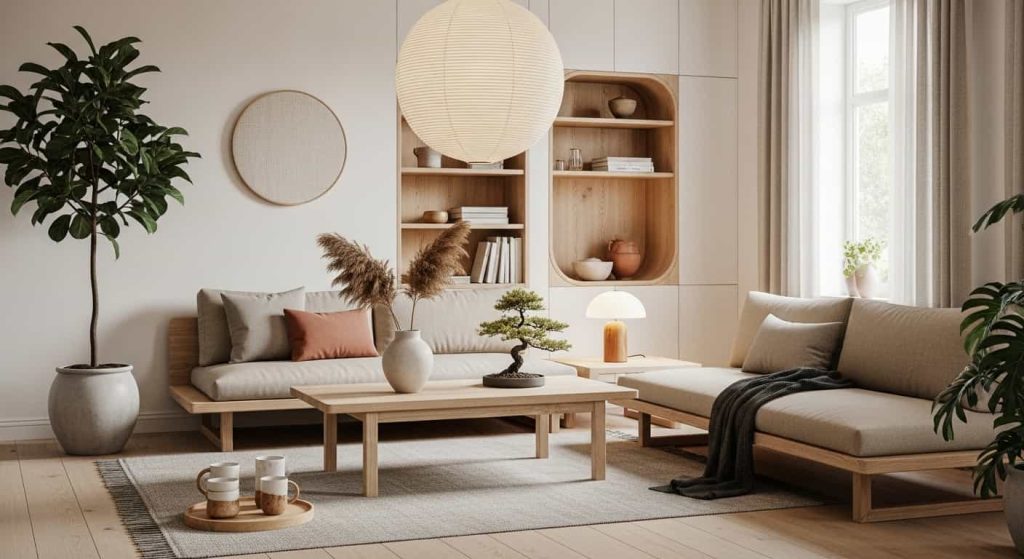
Japandi design is more than an aesthetic; it’s a lifestyle that values simplicity, craftsmanship, and a connection to the natural world. It combines the Japanese concept of “wabi-sabi,” which finds beauty in imperfection, with the Scandinavian principle of “hygge,” which evokes a sense of coziness and contentment.
Similarly, Feng Shui is the ancient art of arranging spaces to allow for the optimal flow of life force energy, or “Chi.” A home with good Feng Shui feels balanced, supportive, and harmonious.
Here’s where their principles beautifully intersect:
- Simplicity and Decluttering: Both philosophies emphasize the importance of a clutter-free environment. In Feng Shui, clutter creates stagnant energy, blocking the flow of positive Chi. Japandi design achieves this through minimalism, advocating for only keeping items that are beautiful, functional, or hold sentimental value.
- Natural Materials: Japandi interiors are rich in natural materials like wood, bamboo, stone, and linen. Feng Shui encourages the use of these elements to ground the space and bring the balancing energy of nature indoors.
- Balance and Harmony: The goal of both is to create a balanced environment. Japandi does this by mixing smooth, modern lines with organic, rustic textures. Feng Shui achieves this by balancing the five elements (Wood, Fire, Earth, Metal, Water) and the dual forces of Yin and Yang.
- Intentionality: Every piece in a Japandi home has a purpose. This intentional approach to design mirrors the Feng Shui practice of placing objects with conscious intent to influence the energy of the space.
Incorporating Mirrors into Japandi Interiors with Feng Shui
Mirrors are powerful tools in Feng Shui, known for their ability to amplify light, expand space, and direct the flow of Chi. In a Japandi interior, mirrors can enhance the style’s core principles while serving a clear Feng Shui purpose. The key is to choose mirrors that align with the Japandi aesthetic—think simple frames, natural materials, and clean lines.
1. Amplify Natural Light
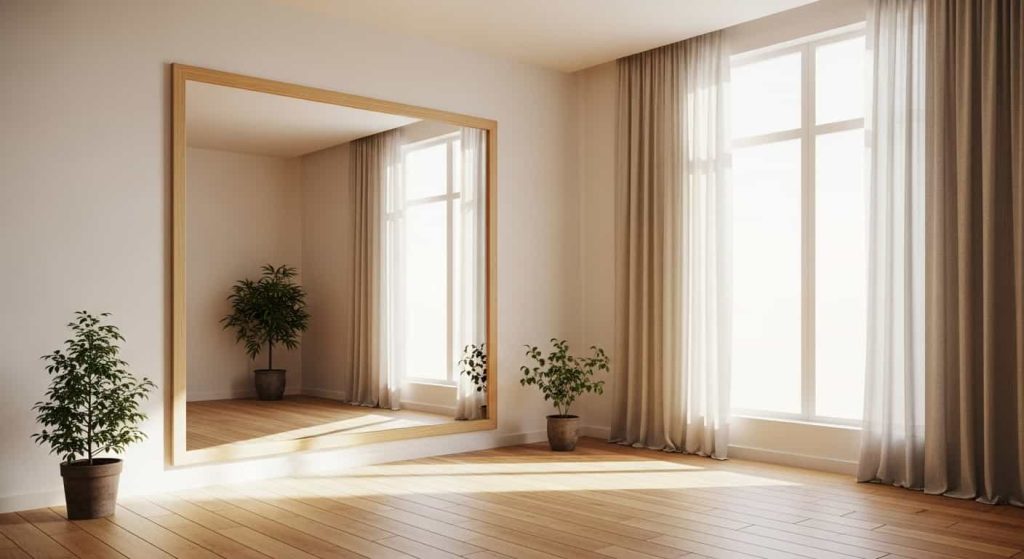
Japandi design celebrates natural light, creating bright, airy spaces that promote a sense of well-being. This aligns perfectly with the Feng Shui use of mirrors to brighten dark areas and keep Chi flowing smoothly.
Practical Tip: Identify the brightest spot in your room, typically a large window. Place a large mirror with a simple, thin frame (in black, white, or natural wood) on the wall opposite the window. This will capture the natural light and reflect it throughout the room, making the space feel more open and vibrant. This is especially effective in smaller rooms or apartments.
2. Create an Illusion of Space
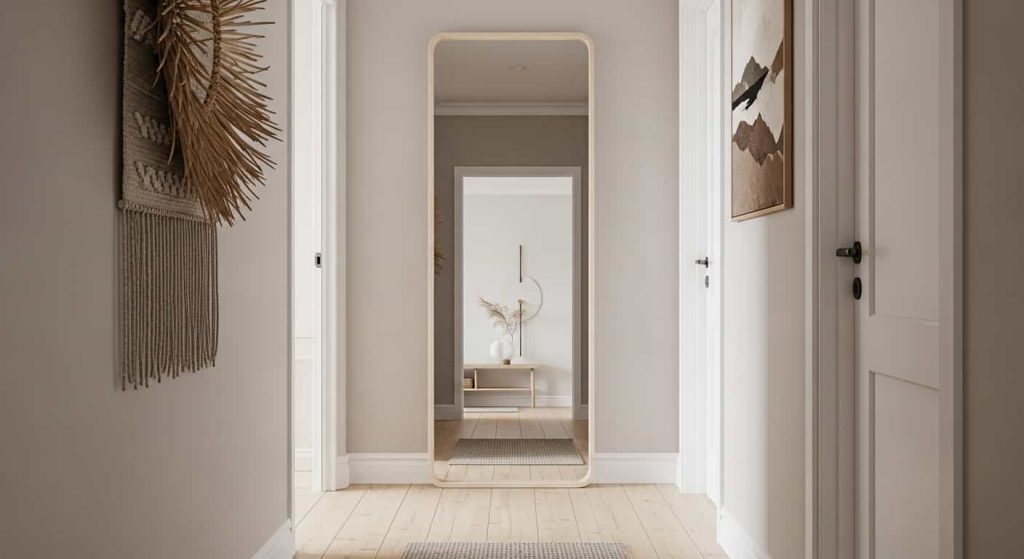
Both the Japandi style and Feng Shui aim to create a feeling of openness. In small or narrow spaces, a well-placed mirror can be transformative.
Practical Tip: In a narrow hallway or a small entryway, hang a large, full-length mirror with a minimalist wood frame. This not only serves a functional purpose but also visually doubles the width of the space, preventing the energy from feeling constricted. A round mirror can also soften the sharp angles of a small room, promoting a gentler flow of Chi.
3. Reflect Nature and Beauty
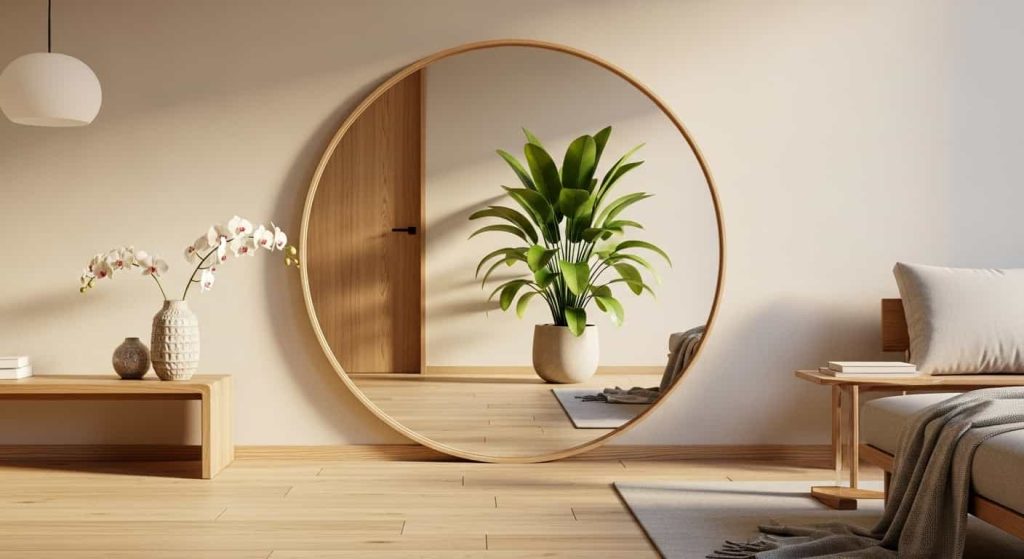
Bringing the outdoors in is central to both philosophies. Use mirrors to strategically reflect natural elements and beautiful objects, thereby doubling their positive energy.
Practical Tip: Position a mirror to reflect a beloved houseplant, a vase of simple, elegant flowers (like an orchid), or a piece of handcrafted pottery. This follows the Japandi principle of appreciating natural beauty while adhering to the Feng Shui rule of reflecting what you want more of in your life. Avoid reflecting clutter or disorganized areas, as this will amplify chaotic energy.
4. Balance the Elements with Mirror Frames
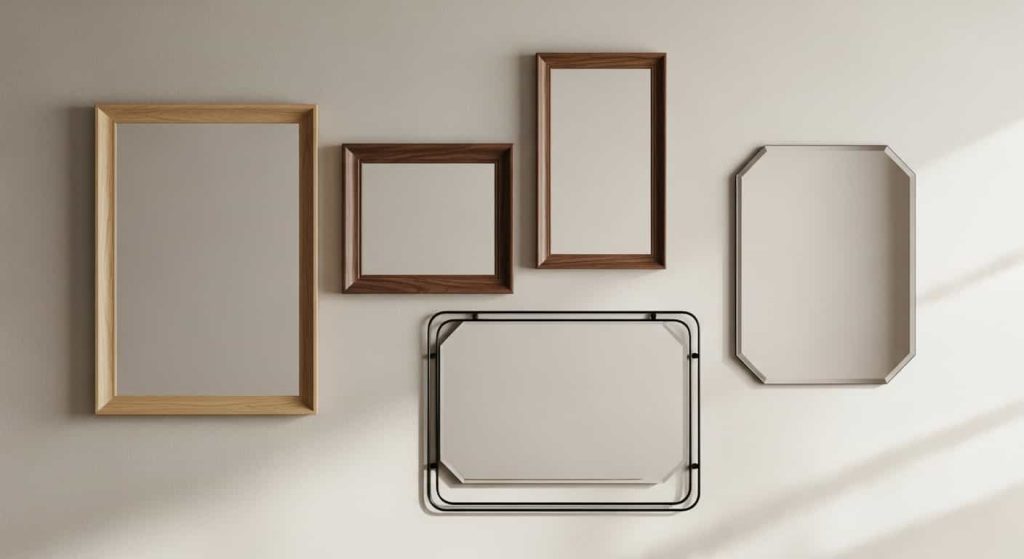
In Feng Shui, the frame of a mirror can be used to introduce a specific element to balance a room. This can be done subtly within the Japandi aesthetic.
- Wood Frames: A light-colored wood frame (like oak or maple) aligns with Scandinavian style and introduces Wood element energy, which promotes growth and vitality. A darker wood frame (like walnut) leans more toward the Japanese aesthetic and adds a grounding quality.
- Metal Frames: A thin, simple frame in black or dark bronze introduces the Water element (in color) or Metal element (in material). Metal enhances clarity and precision, while the dark color is associated with the career and life path area in Feng Shui.
- Frameless or Beveled Mirrors: A frameless mirror is the ultimate minimalist choice, seamlessly blending into the wall and placing all the focus on the reflection itself. This is a perfect fit for a pure Japandi look.
5. Using Mirrors to Maintain the Commanding Position
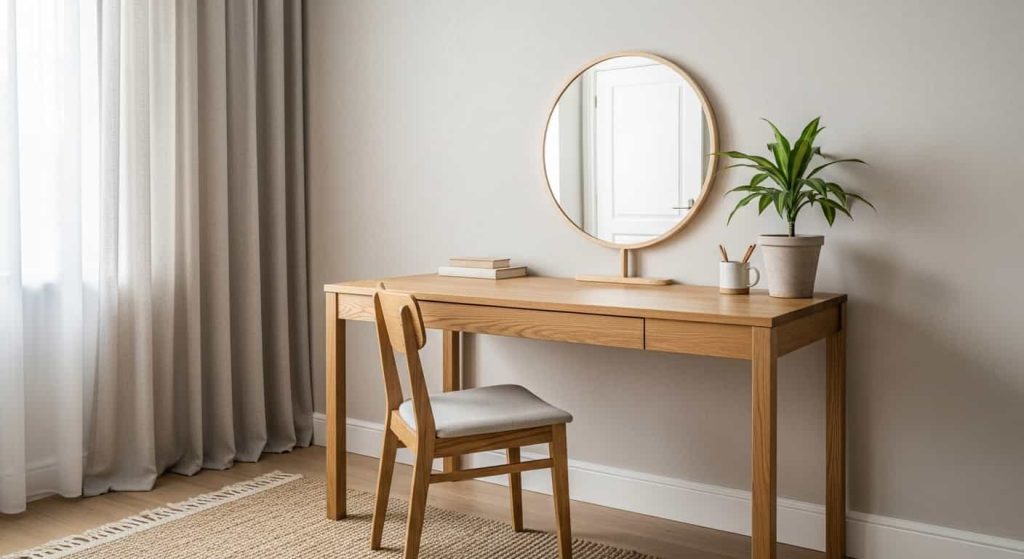
A core principle of Feng Shui is the “commanding position,” where you can see the door to the room without being directly in front of it. This applies to your bed, desk, and even your favorite armchair.
Practical Tip: In a Japandi-style home office where your desk must face a wall, place a small, elegant mirror on the wall in front of you or discreetly on your desk. Choose one with a simple wood or thin metal frame. This allows you to see the doorway in the reflection, providing a sense of security and energetic control without disrupting the serene aesthetic.
Conclusion
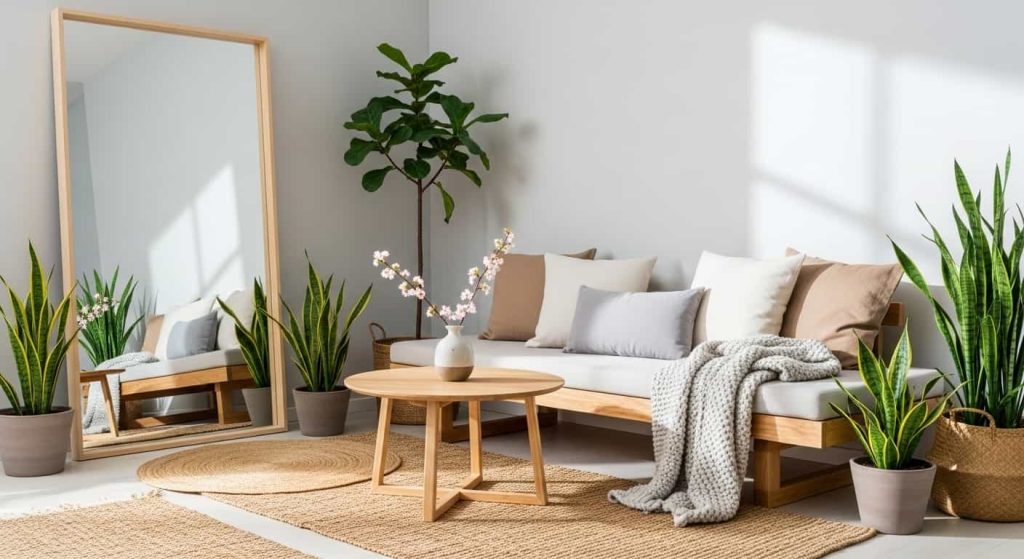
Japandi style and Feng Shui are a natural pairing, both guiding us toward creating homes that are not just visually appealing but also energetically balanced and deeply restorative. The focus on simplicity, nature, and intentionality creates a foundation for a space that supports well-being.
By incorporating mirrors thoughtfully into your Japandi interior, you can enhance these qualities even further. Use them to amplify light, create a sense of spaciousness, and reflect the simple beauty that defines this beloved style. In doing so, you’ll craft a home that is a true sanctuary—a harmonious blend of form, function, and positive energy.
